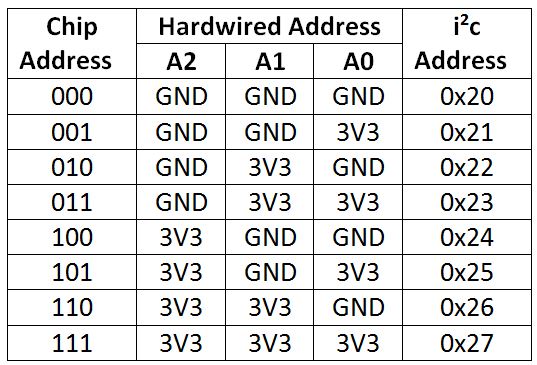
Micropython-MCP230XX
MCP系列GPIO Expander的基于Micropython I2C的操作,源自ADAFRUIT_MCP230XX
4
Github Watches
16
Github Forks
30
Github Stars
micropython-mcp230xx
Micropython I2C-based manipulation of the MCP series GPIO expanders MCP23017 and MCP23008, derived from the Adafruit_MCP230xx.py module of https://github.com/adafruit/Adafruit_Python_GPIO
This has been tested with ESP8266 running Micropython 1.8.7 on MCP23017 only, but hopefully works also for MCP23008 if you have one. Please post an issue if you have success.
To use, wire up the GPIO expander chip following this loom...
- MCP23017 Pins
- 9 => 3.3V supply
- 10 => GND
- 12 => ESP8266 GPIO5 (NodeMCU D1) [I2C SCL Signal]
- 13 => ESP8266 GPIO3 (NodeMCU D2) [I2C SDA Signal]
- 12 => 10kOhm resistor => 3.3V Supply [I2C SCL Pull-up]
- 13 => 10kOhm resistor => 3.3V Supply [I2C SDA Pull-up]
- 18 => 10kOhm resistor => 3.3V Supply [Reset pin in 'run' configuration]
Also choose the address of each MCP23017, e.g.
- Addressing pins for address 0x20
- 15 => 10kOhm resistor => GND
- 16 => 10kOhm resistor => GND
- 17 => 10kOhm resistor => GND
The mappings between pins and I2C addresses are...

If you wish to use a different I2C address, or a different GPIO-numbered SDA or SCL pin than the default then pass that in to the constructor.
The default constructor arguments mean that MCP23017() is equivalent to MPC23017(address=0x20, gpioScl=5, gpioSda=4).
A handy visual reference is this from mathworks, although I recommend that for ESP8266 the chip power should be provided by 3.3V not 5V, to make sure logic levels are correct and that the serial data line doesn't overload SDA.

For example, the following will set the output values of pins 10-15 and read the logic value (True or False) of pins 0-9
import mcp
io = mcp.MCP23017()
# controls some output pins
outPins = list(range(10,16))
nextVals = {}
for pinNum in outPins:
io.setup(pinNum, mcp.OUT)
nextVals[pinNum] = True
io.output_pins(nextVals)
# monitors and prints some input pins
inPins = list(range(0,10))
for pinNum in inPins:
io.setup(pinNum, mcp.IN)
while True:
print(io.input_pins(inPins))
相关推荐
Confidential guide on numerology and astrology, based of GG33 Public information
Take an adjectivised noun, and create images making it progressively more adjective!
Embark on a thrilling diplomatic quest across a galaxy on the brink of war. Navigate complex politics and alien cultures to forge peace and avert catastrophe in this immersive interstellar adventure.
Emulating Dr. Jordan B. Peterson's style in providing life advice and insights.
Reviews
user_9XOhAda2
The micropython-mcp230xx by ShrimpingIt is a fantastic library for integrating MCP230xx series I/O expanders with your MicroPython projects. This well-documented and easy-to-use module opens up a new range of possibilities for adding more I/O ports to your microcontroller with minimal hassle. Highly recommended for any MicroPython enthusiast looking to extend their project capabilities efficiently! Check it out at https://github.com/ShrimpingIt/micropython-mcp230xx.











